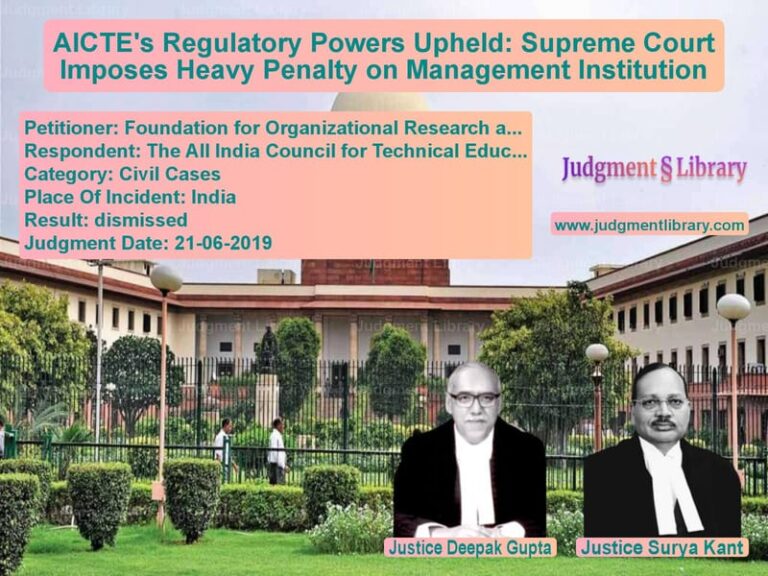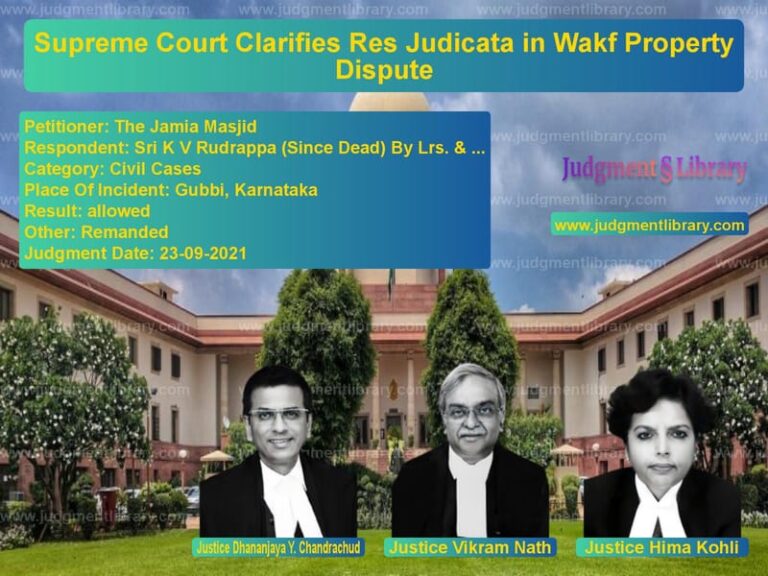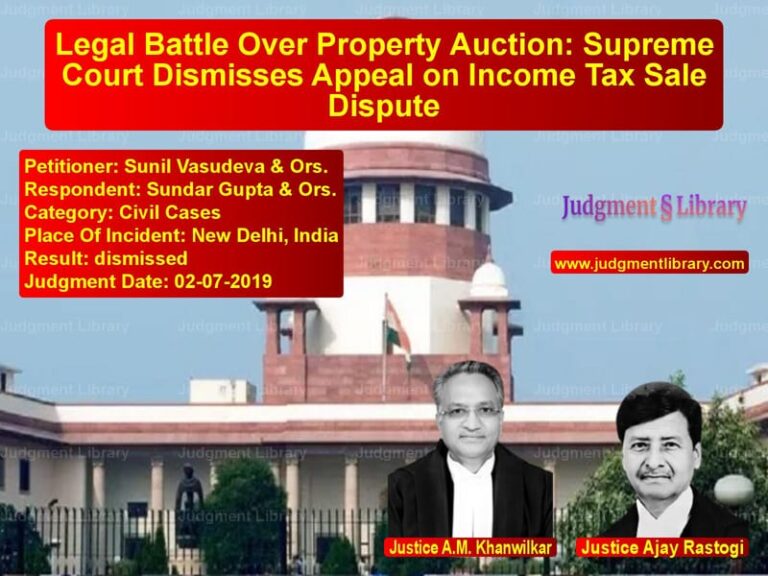Supreme Court Upholds Property Rights: Landmark Ruling in Kuldeep Singh vs. Rajinder Kumar
The Supreme Court of India recently delivered a significant judgment in the case of Kuldeep Singh vs. Rajinder Kumar & Ors., addressing a long-standing property dispute and the application of Order 7 Rule 11 of the Code of Civil Procedure (CPC). The case revolved around whether the civil suit should be dismissed at the preliminary stage due to the alleged absence of a valid cause of action.
Background of the Case
The dispute in question originated from a civil suit filed in 1981 concerning ownership and possession of a property in Delhi. The case was renumbered as Civil Suit No. 903/2011 due to procedural reasons and continued to be litigated over the decades. The petitioner, Kuldeep Singh, approached the Delhi High Court, seeking rejection of the suit under Order 7 Rule 11 CPC, which allows for a plaint to be dismissed if it fails to disclose a cause of action.
The High Court, after reviewing the case, dismissed the petition and allowed the suit to proceed to trial. Dissatisfied with this ruling, Kuldeep Singh appealed to the Supreme Court, arguing that the suit had been pending for an unreasonable period and had no merit.
Key Issues Before the Supreme Court
- Whether the civil suit lacked a valid cause of action, making it liable for rejection under Order 7 Rule 11 CPC.
- Whether prolonged litigation justified dismissing the suit outright.
- Whether the High Court correctly interpreted the legal and factual aspects of the case.
Arguments by the Appellant (Kuldeep Singh)
The appellant, Kuldeep Singh, presented the following arguments:
- The suit had been pending since 1981, and its continued existence was an abuse of the judicial process.
- The plaint did not disclose a valid cause of action, making it fit for rejection under Order 7 Rule 11 CPC.
- The High Court failed to appreciate that the case had become infructuous due to the excessive delay.
- The suit was based on weak and inconsistent claims regarding property ownership.
Arguments by the Respondents
The respondents, led by Rajinder Kumar, countered these claims, stating:
- The suit clearly disclosed a cause of action, which was evident from the pleadings.
- The mere passage of time does not invalidate a suit, especially when delays are caused by procedural hurdles rather than the plaintiffs’ inaction.
- The trial court was the appropriate forum to decide the case on its merits rather than rejecting it prematurely.
- The rejection of the suit under Order 7 Rule 11 CPC would deny the plaintiffs their rightful opportunity to prove their claims in court.
Supreme Court’s Judgment
The Supreme Court dismissed the appeal and upheld the High Court’s ruling, stating:
1. Suit Not Liable for Rejection Under Order 7 Rule 11 CPC
The Supreme Court observed that the suit disclosed a prima facie cause of action. It ruled:
“Going by the pleadings in the suit, it cannot be said that no cause of action was made out. A mere assertion that the suit lacks merit does not warrant its rejection at the threshold.”
2. Civil Suits Must Be Decided on Merits
The Court emphasized that suits should be decided on their merits and that procedural delays should not be used as a ground for dismissal.
“A suit cannot be dismissed merely because it has been pending for several years. The right to seek adjudication is fundamental, and the trial court must examine the evidence before reaching a conclusion.”
3. Delay in Litigation Is Not Grounds for Dismissal
The Supreme Court rejected the argument that long delays in litigation should justify dismissing the suit.
“Judicial delays are often caused by systemic inefficiencies rather than the litigants themselves. Dismissing a suit due to prolonged pendency would set a dangerous precedent.”
4. Trial Court Must Expedite Proceedings
Recognizing the long history of the case, the Supreme Court directed the trial court to expedite the proceedings.
“We direct the Trial Court to dispose of the suit positively within six months.”
Key Takeaways
- Order 7 Rule 11 CPC must be applied strictly: A suit cannot be rejected unless it completely fails to disclose a cause of action.
- Prolonged litigation does not justify rejection: Courts should not dismiss cases simply because they have been pending for an extended period.
- Trial courts must adjudicate on merits: The Supreme Court reiterated that courts must hear cases based on evidence rather than dismiss them prematurely.
- Expedited trials for old cases: The judgment highlights the need for faster resolution of long-pending cases.
Conclusion
The Supreme Court’s ruling in Kuldeep Singh vs. Rajinder Kumar & Ors. reinforces the principle that civil suits should not be dismissed at the threshold unless they clearly lack merit. The judgment ensures that procedural technicalities do not hinder substantive justice and underscores the importance of allowing cases to be decided on their merits.
Don’t miss out on the full details! Download the complete judgment in PDF format below and gain valuable insights instantly!
Download Judgment: Kuldeep Singh vs Rajinder Kumar & Ors Supreme Court of India Judgment Dated 20-10-2016.pdf
Direct Downlaod Judgment: Direct downlaod this Judgment
See all petitions in Property Disputes
See all petitions in Specific Performance
See all petitions in Damages and Compensation
See all petitions in Judgment by Kurian Joseph
See all petitions in Judgment by Rohinton Fali Nariman
See all petitions in dismissed
See all petitions in supreme court of India judgments October 2016
See all petitions in 2016 judgments
See all posts in Civil Cases Category
See all allowed petitions in Civil Cases Category
See all Dismissed petitions in Civil Cases Category
See all partially allowed petitions in Civil Cases Category







